Greek > AS Mark Scheme > GCE Classical Greek H444/02: Prose Composition or Comprehension Advanced GCE Mark Scheme for Novembe (All)
GCE Classical Greek H444/02: Prose Composition or Comprehension Advanced GCE Mark Scheme for November 2020
Document Content and Description Below
Oxford Cambridge and RSA Examinations GCE Classical Greek H444/02: Prose Composition or Comprehension Advanced GCE Mark Scheme for November 2020Oxford Cambridge and RSA Examinations OCR (Oxford ... Cambridge and RSA) is a leading UK awarding body, providing a wide range of qualifications to meet the needs of candidates of all ages and abilities. OCR qualifications include AS/A Levels, Diplomas, GCSEs, Cambridge Nationals, Cambridge Technicals, Functional Skills, Key Skills, Entry Level qualifications, NVQs and vocational qualifications in areas such as IT, business, languages, teaching/training, administration and secretarial skills. It is also responsible for developing new specifications to meet national requirements and the needs of students and teachers. OCR is a not-for-profit organisation; any surplus made is invested back into the establishment to help towards the development of qualifications and support, which keep pace with the changing needs of today’s society. This mark scheme is published as an aid to teachers and students, to indicate the requirements of the examination. It shows the basis on which marks were awarded by examiners. It does not indicate the details of the discussions which took place at an examiners’ meeting before marking commenced. All examiners are instructed that alternative correct answers and unexpected approaches in candidates’ scripts must be given marks that fairly reflect the relevant knowledge and skills demonstrated. Mark schemes should be read in conjunction with the published question papers and the report on the examination. © OCR 2020H444/02 Mark Scheme November 2020 Annotations Annotation Meaning Specific improvement to be rewarded with a style mark Division between sections of a translation Unclear Benefit of doubt Blank page: this annotation must be used on all blank pages within an answer booklet (structured or unstructured) and on each page of an additional object where there is no candidate response Repeated error; unpenalised; or consequential error resulting from a previous error; not to be re-penalised Major error, necessarily resulting in a reduced maximum mark for the section Incorrect: resulting in a reduced or no mark Not fully correct: possibly resulting in a reduced mark Omission, necessarily resulting in a reduced maximum mark for the section Point credited, or (for prose composition) alternative accepted as correct Noted but no credit givenH444/02 Mark Scheme November 2020 Subject Specific Marking Instructions Question Answer Mark Guidance 1 (a) Establish the Four Hundred (1). 1 1 (b) He was unwilling to be with them/on their side (1) though/when they asked/invited him (1). 2 For the first mark accept other renderings that retain sense e.g. “he refused to join the Four Hundred” 2 (a) That he strongly opposed their deeds (1) and was loyally disposed (1) to the majority/people (1). 3 Accept “the events” or similar for πραξεις 2 (b) That they were not able to move/change (1) what was established (1) until he was out of their way (1). 3 Accept other meanings for κινειν such as “to disturb” and various reasonable translations of οὐδεν… των καθεστωτων 3 (a) That the city would be especially angry (1) about things concerning the gods (1), if anyone was obviously / was proven/ was seen (1) to be committing wrong against The Mysteries (1), [and about other matters] if anyone dared (1) to overthrow/bring down the democracy (1). 6 Ignore τῶν δ᾽ ἄλλων 3 (b) That the father assembled his association (1) for revolution/new deeds (1), and that these men, dining together at the house of Pulytion (1), had performed/done The Mysteries (1). 4 Require a sense of “convening” for συναγοι (not “lead”) Accept “they” as an alternative for “these men” 4 (a) Because of the greatness/seriousness (1) of the accusations (1). 2 Accept “size/scale” of the chargesH444/02 Mark Scheme November 2020 Question Answer Mark Guidance 4 (b) He (the father) clearly proved/showed (1) that the men were lying (1), with the result that the people (1) elected him general to Sicily (1). 4 5 The passage has been divided into 2 sections, each worth 5 marks. Award up to 5 marks per translated section according to the 5-mark marking grid found above. μετὰ δὲ ταῦθ᾽ ὁ μὲν ἐξέπλευσεν, οἱ δὲ οὐ πρότερον ἐπαύσαντο, πρὶν τόν τε πατέρ᾽ ἐκ τοῦ στρατοπέδου μετεπέμψαντο, After this, he sailed away, but they did not stop until they (had) sent for my father from the expedition/camp, 5 καὶ τῶν φίλων αὐτοῦ τοὺς μὲν ἀπέκτειναν, τοὺς δ᾽ ἐκ τῆς πόλεως ἐξέβαλον. and they killed some of his friends, but/and cast out others from the city. 5H444/02 Mark Scheme November 2020 Question Answer Mark Guidance 6 (a) Aorist (active) participle (1) of καθίστημι (1) 2 6 (b) Participle (1) of οἶδα (1) 2 Ignore any tense given 6 (c) Aorist (1) of ἐπιδείκνυμι (1) 2 7 (a) Dative, after verb ἐπιβουλεύσαντες 1 Accept “object of ἐπιβουλεύσαντες” if case correctly given Accept translation “plotting against the people” as explanation 7 (b) Genitive in genitive absolute construction with συλλεγείσης 1 Accept translation “after/when…” as explanation 7 (c) Accusative, complement of/agreeing with αὐτὸν 1 “direct object” not acceptable without mention of αὐτὸν Accept translation ‘elected him as general’ as explanation 8 (a) (Aorist passive) participle (1), (agreeing with object (τὴν πόλιν)) in indirect statement construction (introduced by εἰδότες, / a word meaning “know”) (1) 2 8 (b) (Aorist active) participle (1), nominative as agreeing with subject of the main verb (εἰσήγγελλον) [1] 2 8 (c) (Aorist) optative (1), in indirect statement (introduced by λέγοντες ὡς), (in historic sequence / when the main verb is past) (1) 2H444/02 Mark Scheme November 2020 Section B: Prose Composition Guidance on applying the marking grids for translating into Classical Greek The passage has been divided into 9 sections each worth 5 marks. Award up to 5 marks per translated section according to the 5-mark marking grid for translation into Classical Greek. The general principle in assessing each section should be the proportion (out of 5) of sense achieved. There are many acceptable ways of turning a piece of English into correct Greek. One approach for each sentence is given, with occasional alternatives. Further acceptable alternatives will be illustrated at Standardisation, but examiners will need to assess on its own merits any approach that satisfactorily conveys the meaning of the English. Examiners should remember that more things can go wrong in Greek prose than in Latin prose, and that therefore in order for the assessment to be comparable in both subjects it is necessary to work from the marking grid rather than by “counting up errors”. The determination of what a “slight” error is only necessary when it is the only error in a section; this distinction will then determine whether a mark of 5 or 4 is appropriate. Where marks of 4, 3, 2, 1 and 0 are applicable, the overall proportion of meaning conveyed in the section is the only consideration. The term “major” error has been used here to determine an error which is more serious than a “slight” error. The classification below should be seen only as a general guide, the intention of which is to maintain standards year-on-year. Lead markers should consider each instance on its own merits in the context of the passage and the section. It is likely that some of the errors below may be regarded as “major” if they appear in a relatively short and straightforward section, whereas in longer or more complex sections they are more likely to be a “slight” error. The sort of errors that we would generally expect to be considered as “slight” errors would be: • a single mistake in a word • the omission of an uninflected word • omission or incorrect use of a breathing (to be penalised only once in the passage) • omission of a connecting particle would constitute a slight error The sort of errors that we would generally expect to be considered as “major” errors would be: • more than one mistake in a word • the omission of an inflected word The final decisions on what constitutes a ‘slight’ and ‘major’ error has been made and communicated to assessors via the standardisation process (after full consideration of candidates’ responses) and these decisions are exemplified in the final mark scheme for examiners and centres. Accents are not expected, but breathings are. Do not, however, penalise repeated omitted breathings, omitted elision or omitted nu before a vowel.H444/02 Mark Scheme November 2020 Marks Description 5 Accurate translation with one slight error allowed 4 Mostly correct 3 More than half right 2 Less than half right 1 Little recognisable relation to the English; or little meaning conveyed 0 No response or no response worthy of credit Additional marks for style Additional marks (one per instance, to a maximum of 5) should be awarded for individual instances of stylish Greek writing. Style marks may be awarded for such features as: • Attempts at connection and subordination • particularly imaginative, creative or felicitous choice of vocabulary • thoughtful use of word-order (including the “genitive sandwich”) • employment of apt particles beyond the obvious • subordination of main verbs into participles (usually a maximum of one mark for this per passage) • appropriate use of genitive absolute Exemplification of frequently used examples of ‘stylish’ use of Greek will be made and communicated to assessors via the standardisation process (after full consideration of candidates’ responses) and these will be captured in the final mark scheme for examiners and centres. Identical examples of the same style point (eg repetition of the same particle or idiom) should not be credited twice, but examiners should err on the side of generosity if the context means that complex morphology or word order has been achieved in a significantly different way. The restriction is only intended to avoid awarding the rubber-stamping of a stock style technique.H444/02 Mark Scheme November 2020 9 (i) When they learned that the Thebans were inside their gates and had captured the city, ὡς δέ ἐπύθοντο τοὺς Θηβαίους τὴν πόλιν λαβόντας ἐντὸς τῶν πυλῶν εἶναι, 5 Accept alternative vocabulary for “learned” (Accept ὄντας, as acc. + inf. or participle are possible after πυνθάνομαι) + expressing ‘learn’ as a participle (eg μαθόντες) (ii) the Plataeans were frightened and thought that more had entered than were really there, οἱ Πλαταιῆς ἐφοβοῦντο καὶ ἐνόμισαν πλείους/πλείονας εἰσελθεῖν ἤ τῷ ὄντι παρῆσαν, 5 + φοβούμενοι (iii) for they could hardly see in the night. Therefore they decided to make a treaty, μόλις γὰρ ἐν τῇ νυκτί ἰδεῖν ἐδύναντο. ἐδόκει οὖν αὐτοῖς σπένδεσθαι, 5 + rendering with ‘night’ as subject and κωλύω + vocabulary/idiom for ‘made it difficult’ + ἅτε & participle (this incorporates the sense of “could”) (iv) since the Thebans were not doing harm to anyone. But somehow, while doing this, the Plataeans διότι οἱ Θηβαῖοι οὐδένα ἔβλαπτον. ἀλλά πως οἱ Πλαταιῆς ταῦτα πράσσοντες 5 + genitive absolute (τῶν Θηβαῖων οὐδένα βλαπτόντων) (v) realised that the Thebans were few and believed that they could easily attack and defeat them. ᾔσθοντο τοὺς Θηβαίους ὀλίγους ὄντας καὶ ἐπίστευον (αὐτοὺς) προσβαλόντες ῥᾳδίως νικήσειν. 5 + οὐ πολλοὺς + subordination through a participle + idiomatic vocabulary for ‘attack/defeat’ (eg κρατήσειν) (vi) When everything was ready, they waited for their opportunity. ἐπεὶ δὲ πάντα ἑτοῖμα ἦν, τὸν καιρὸν ἔμενον. 5 A short section; all errors will be major. + genitive absolute (vii) Then, before daybreak, they went out of their houses against the enemy. ἔπειτα δὲ πρὸ τῆς ἡμέρας ἐπὶ τούς πολεμίους ἐκ τῶν οἰκιῶν ἐχώρουν. 5 + idiom for ‘before daybreak’; ὡς εἰσβαλόντεςH444/02 Mark Scheme November 2020 (viii) They made their assault as quickly as possible, since it was still night καὶ μέν ὡς τάχιστα προσέβαλον, τῆς νυκτὸς ἔτι οὔσης, 5 + use of μέν… δὲ for contrast between the Plataeans and the Thebans (illustrated here; otherwise require a connecting particle as usual) (ix) and the Thebans, unfamiliar with the city, were at a loss, not knowing what to do. οἱ δὲ Θηβαῖοι, ἄπειροι τῆς πόλεως ὄντες, ἠπόρησαν καὶ ἠγνόουν / οὐκ ιἤδεσαν τι ποιοῖεν. 5 Accept subjunctive ποιῶσιν + recasting such as εἰδότες οὔτε τὴν πόλιν οὔτε τι ποιοῖενOCR (Oxford Cambridge and RSA Examinations) The Triangle Building Shaftesbury Road Cambridge CB2 8EA [Show More]
Last updated: 1 year ago
Preview 1 out of 11 pages
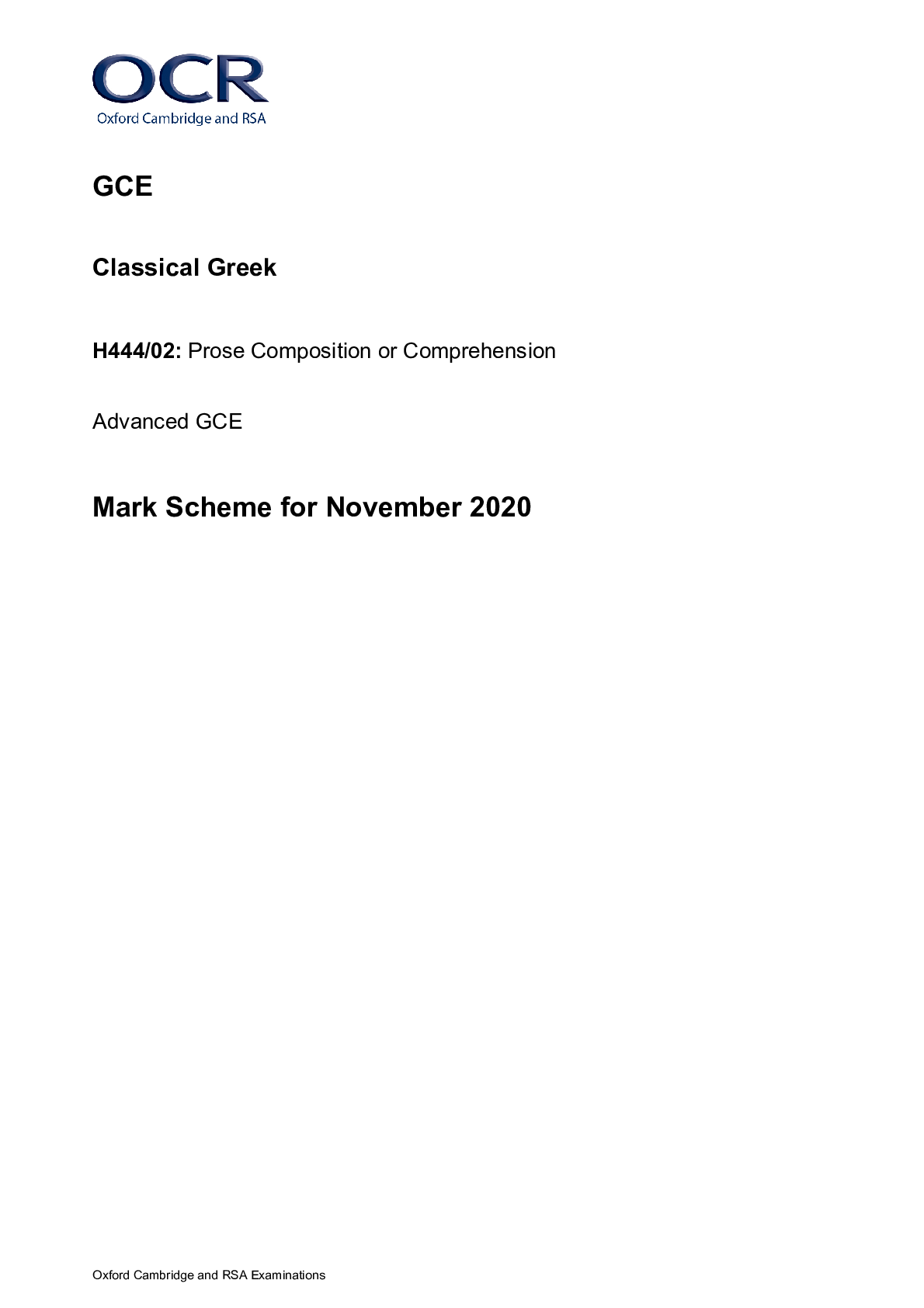
Reviews( 0 )
Document information
Connected school, study & course
About the document
Uploaded On
Oct 10, 2022
Number of pages
11
Written in
Additional information
This document has been written for:
Uploaded
Oct 10, 2022
Downloads
0
Views
47

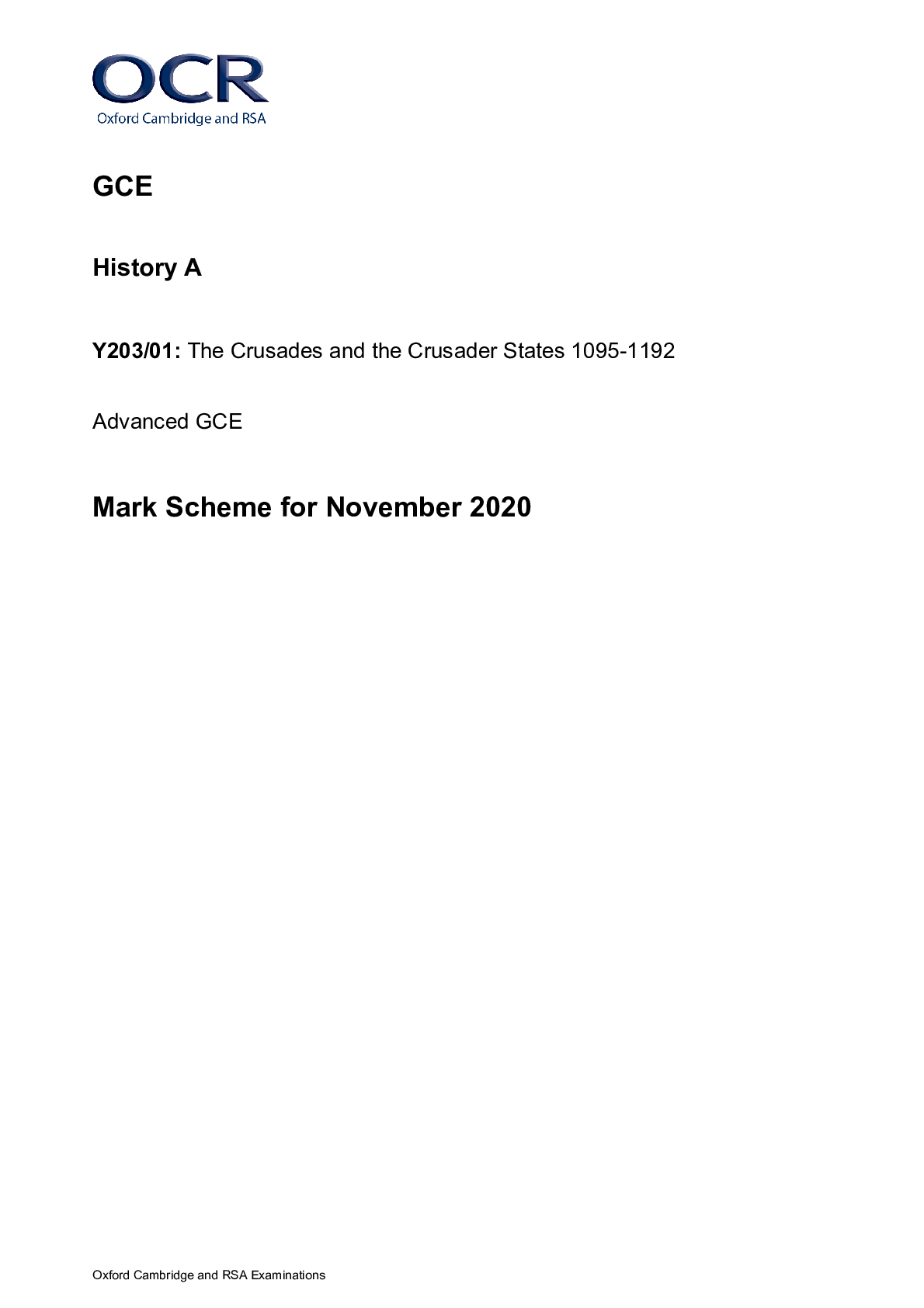




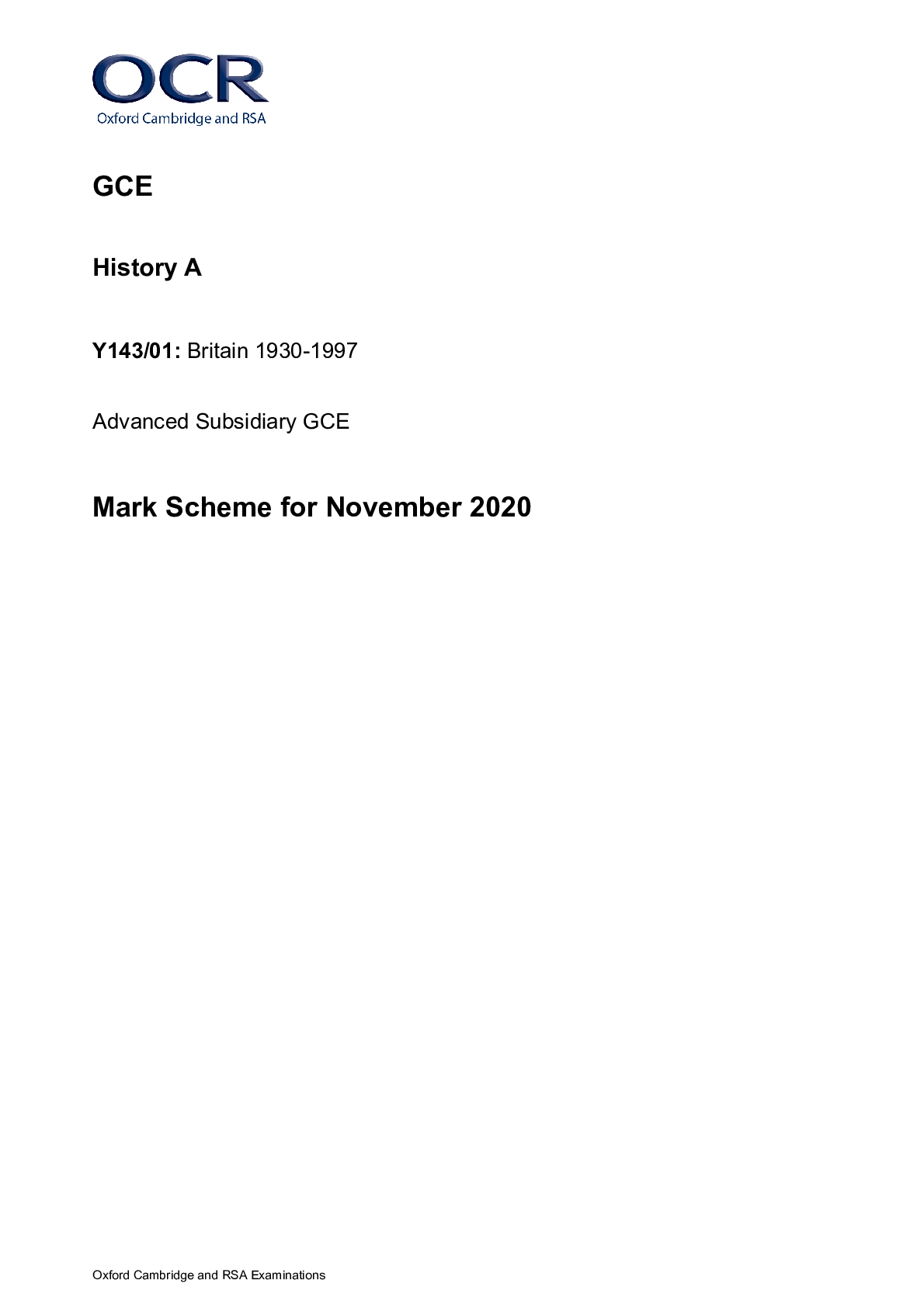



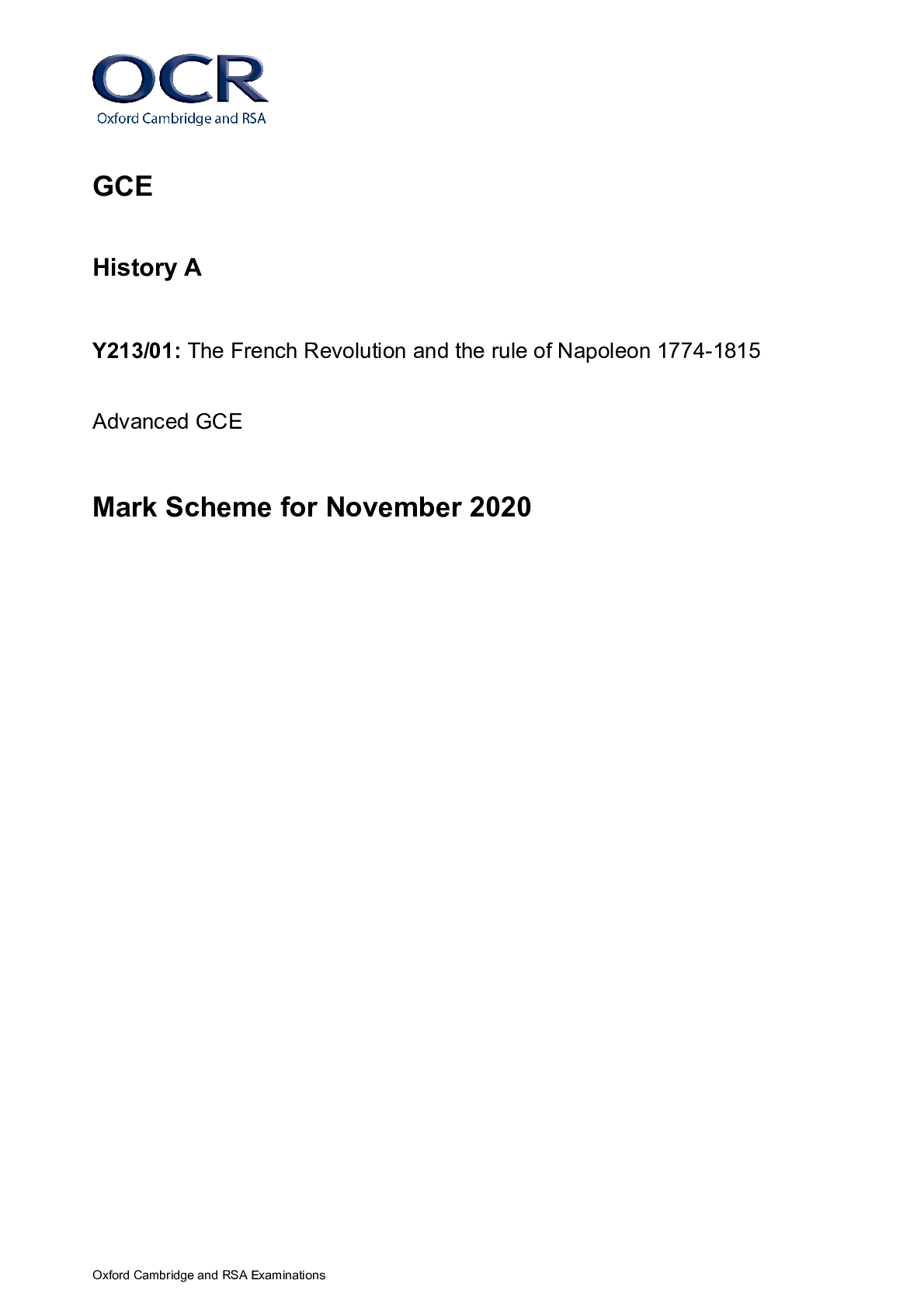


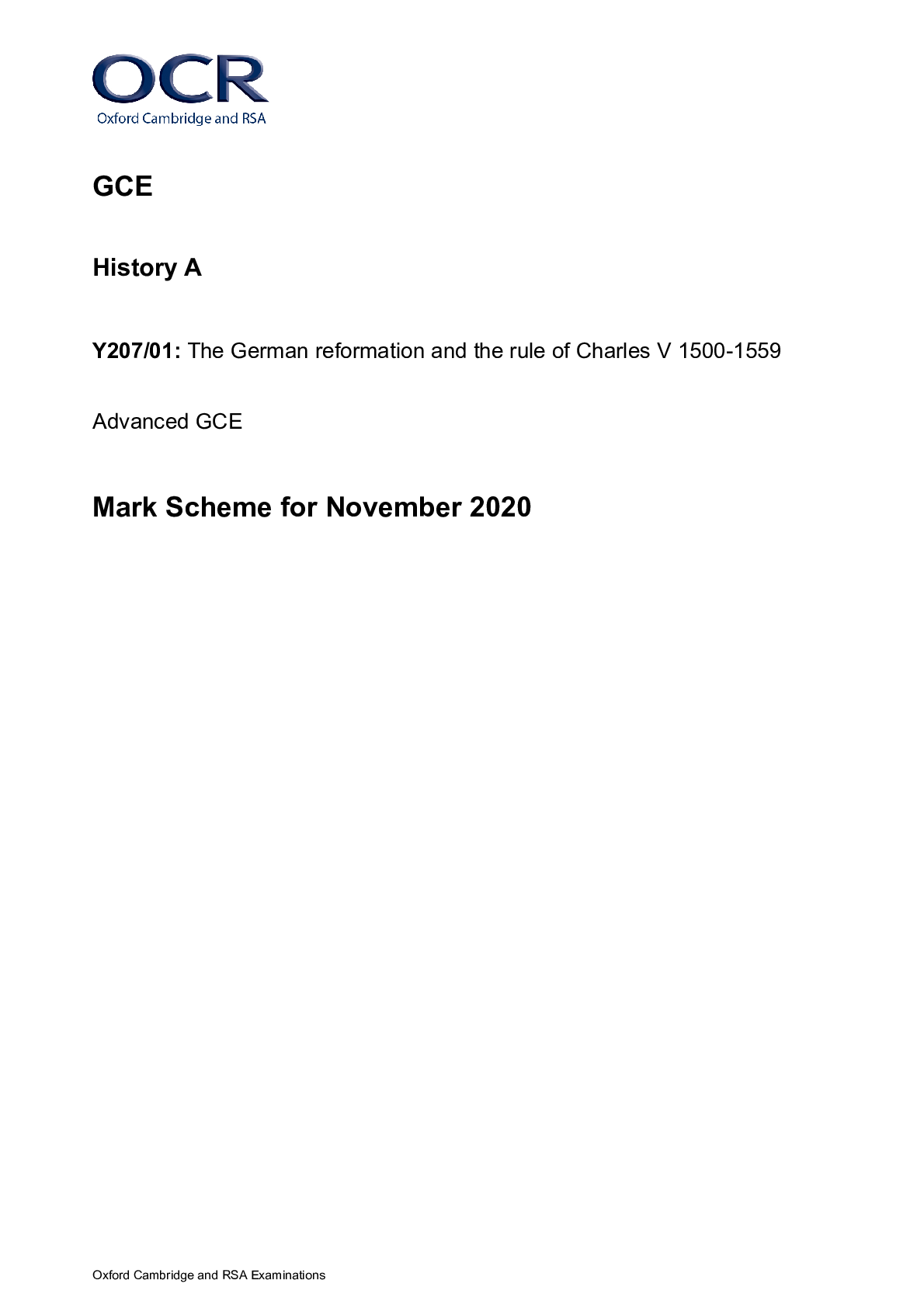

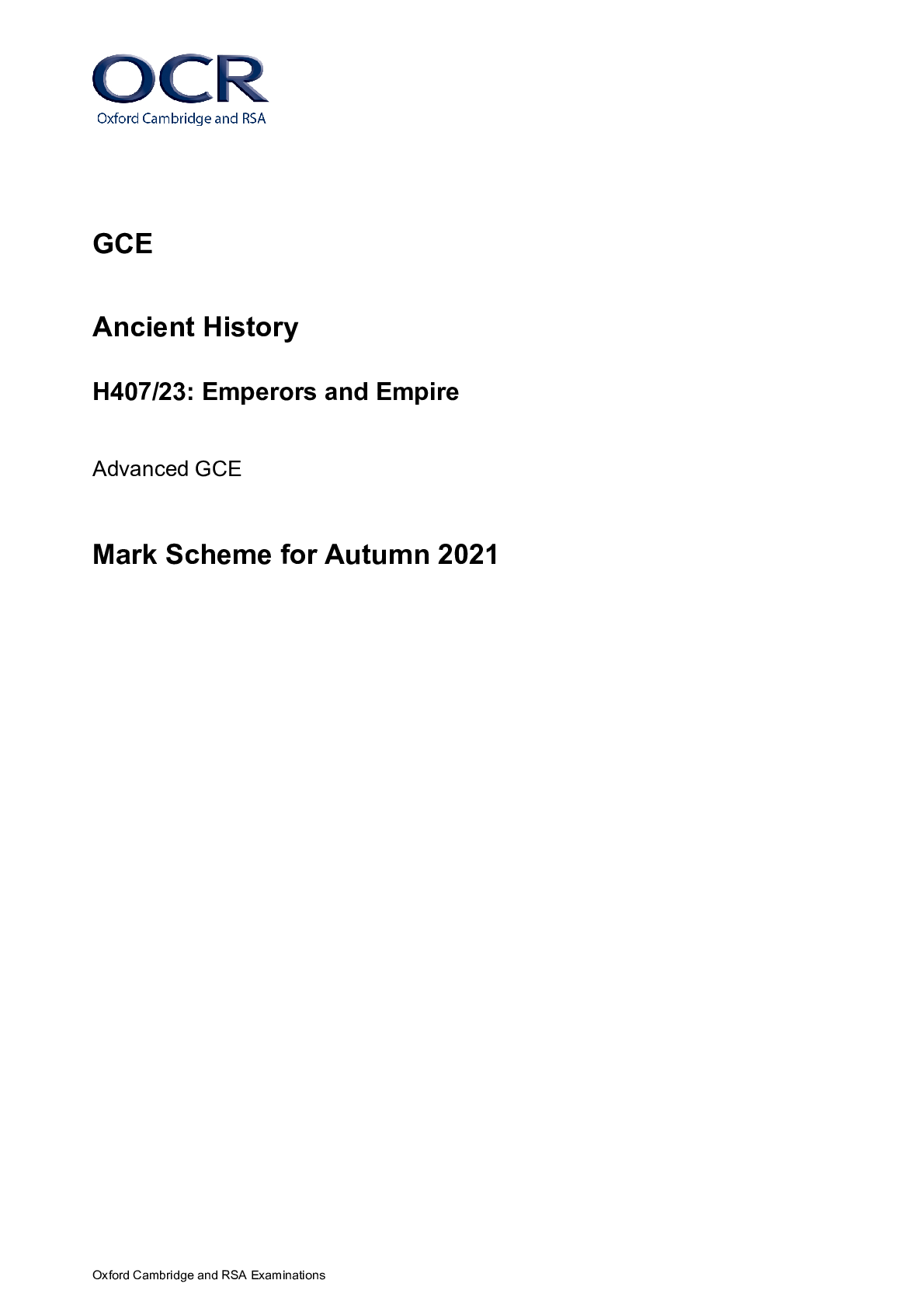

.png)






